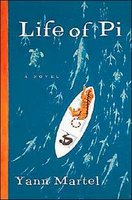Life of Pi
 I read Life of Pi, a defining book by Yann Martel, a while ago on my trip to Yellowstone. How appropriate, considering both the book and my destination are filled with wild animals and their interaction with humans?
I read Life of Pi, a defining book by Yann Martel, a while ago on my trip to Yellowstone. How appropriate, considering both the book and my destination are filled with wild animals and their interaction with humans?The story starts off with the author Yann Martel travelling all over the world to get over his writer's block, and he stumbles upon an old man in India. This man tells him he knows of a story which will make Yann "believe in God", and directs him to another man in Canada. This man is Pi Patel, or Piscine Molitor Patel. If you really want to know the reason behind the unfortunate name, you should read the book. Pi Patel then narrates an unbelievable and extraordinary adventure from his childhood.
Pi Patel is an unusual boy. He grows up in Pondichery, India. He's the son of a zookeeper, and has an encyclopedic knowledge of animal behavior. He's also seemingly touched by God, and is drawn towards Christianity and Islam in addition to his native Hinduism, from a young age. The scene where the priests from the neighborhood temple, church and mosque meet his parents and start arguing about his religious background and where he belongs is simply hilarious.
When Pi is sixteen, his family emigrates to north America along with the zoo animals. The ship flounders and he finds himself in a lifeboat with a few animals and Richard Parker. So what's the big deal, you ask? Well, Richard Parker is a 450-pound Bengal tiger! Other animals on the boat include a hyena, a orangutan and a wounded zebra. What happens aboard the boat? How did the animals react to each other and to Pi? How did Pi survive 227 days in the middle of the Pacific with a Bengal tiger for company?
If you want to get these questions answered, pick up a copy. A fantastical journey into the depths of the human mind, faith and the limits of endurance, it combines philosophy, animal behavior and the selective transformation of reality. The whole story is told in Pi's own voice, and the author approaches it like a biography or a work of non-fiction. But is this story real or is it not? Does Pi exist, or has the author cleverly manipulated you? If you think you'll find out when you finish the story, think again.
This book is funny, deeply philosophical and inspiring in equal parts. A must read.
1 Comments:
I guess you are using this to overcome your
own writer's block. Hope to see more during
the long weekend :)
Post a Comment
<< Home